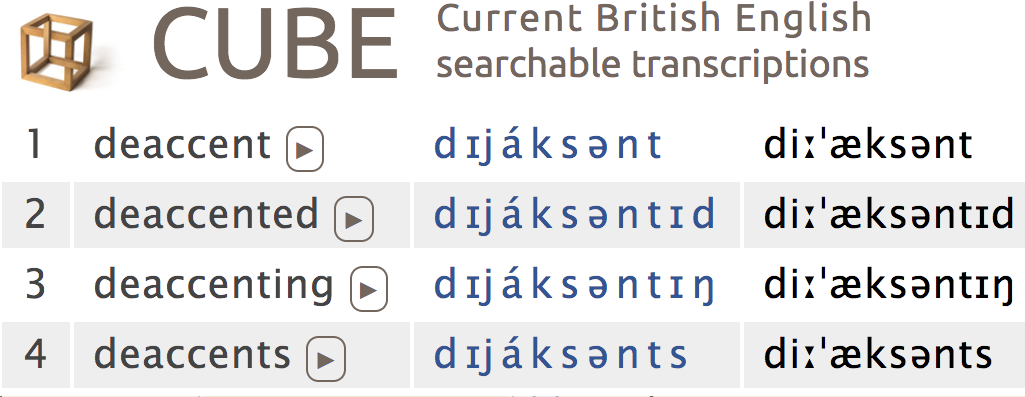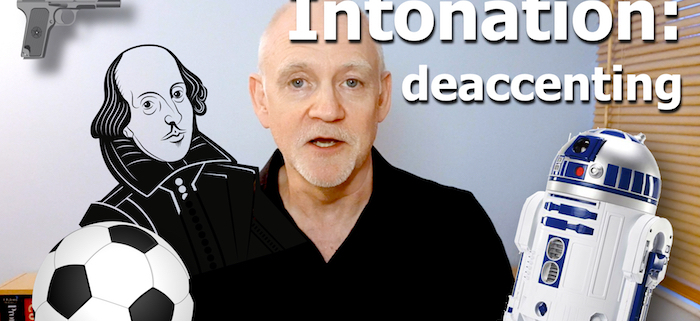Intonation: Deaccenting
Today I’ll look at an important feature of English intonation that many non-natives find really difficult. This is deaccenting: saying a word, especially at the end of a phrase, without any accentuation.
We can see deaccenting at work in ‘compound stress’, where the second of two words loses its accent:
airport
seat-belt
waterpolo
hearing loss
press conference
The difficult thing for most non-natives is not where you put the accent, it’s saying the final word without an accent.
A very important function of English deaccenting is to indicate given information (also called old information). Given information means an idea that’s already in the mind, such as a word that’s just been said.
Consider the way James Bond introduces himself. He always uses two phrases. The first is just the word Bond, and the second phrase is James Bond. The repetition of Bond is given information, and it’s deaccented: it loses the accent it had in the first phrase. Now there has to be a main accent in every phrase, so in the second phrase it has to go on James, the new information in that phrase. It becomes like a compound: airport, press conference, James Bond.
Most other major languages don’t work like this, and many non-natives find that it doesn’t come at all naturally to deaccent given information. The artists who dub Bond into Spanish generally do quite a good job of mimicking the English intonation, but we can find examples of Bond, James Bond with an accent on the second Bond:
An even more famous dramatic line with this kind of repetition is Hamlet’s To be or not to be. It’s the most well-known line in English literature, and actors performing Hamlet often feel an obligation to say the line in a unexpected way. But when English speakers quote this line, we practically always deaccent the repeated to be, putting the main accent on the new word, not: to be or not to be. This normal pattern is the one used by the actor David Tennant:
In Italian, to be or not to be is essere o non essere, and examples on the internet typically show accentuation of the second essere:
There’s a widely-held belief that English accentuation is all about emphasizing “important” words. It isn’t. We don’t say press conference because press is more “important” than conference; it’s because it’s a compound. The reason we say Bond, James Bond is not that James is more “important” than Bond; and in to be or not to be, the relative “importance” of not and to be is the same whether Hamlet’s Danish, English, Italian or Japanese. English just happens to deaccent repeated items.
In my last post, I mentioned that expressions ending in numbers have the main accent on that number. Examples:
Toy Story 2
mp3
high five
double-O 7
Apollo 13
An exception to this is the little robot from Star Wars, R2-D2, who has the main accent not on the final number, but on the letter before it. The final 2, of course, is a repetition: it’s given information, and deaccented. There’s also a contrast, between the two letters. Contrasted items are often accented, and this gives us R2-D2 – so that neither instance of the repeated number is accented.
There’s something similar to this in the way football scores are read out. Normally there are main accents on the scores (the names of the teams often have accents too):
Arsenal one – Liverpool two
But there’s an exception to this when the score is a draw. If the score is repeated, it’s deaccented, and its main accent must go on the team:
Arsenal one – Liverpool one
Here’s a real example from the BBC:
Manchester City two – Crystal Palace three
Newcastle United nil – Fulham nil
Alternatively, the announcer could have highlighted the contrast between the two teams who have drawn, and deaccented both instances of the repeated number: Newcastle United nil – Fulham nil. This would be even closer to R2-D2.
To end, let me point out that the deaccenting of repeated numbers generally doesn’t apply within a single numerical expression like a phone number, date or price, where we adhere to the basic rule of putting the main stress on the final number. So £5.95 is five ninety-five, not five ninety-five. The current year is 2020 not 2020. But if we have repetition across two numerical expressions, deaccenting and contrastive stress typically come into play. For example, fourteen and eighteen have their main stress on -teen, but 1914-1918 is typically nineteen fourteen to nineteen eighteen, like RD-D2.
Further note
I’ve been asked about my pronunciation in the video of the verbs accent and deaccent with stress on ac, rather than on cent as traditional dictionaries suggest. My pronunciation is quite well established. (I once consulted the British tutors on the Summer Course in English Phonetics about the verb accent, and they agreed on initial stress.) This could be American influence: AmE prefers initial stress on the verb accent, like the verb research. My book English After RP has a chapter on the tendency for BrE to shift stress earlier like this.
Here are all six examples currently available on YouGlish of British speakers saying accented. All six have initial stress. The first three examples have schwa in the second syllable, áksəntɪd. The last two have the vowel of DRESS in the second syllable, as in AmE, áksɛntɪd. The fourth example sounds intermediate to me.
Singers are forced to stress syllables as they are accented in the music
stronger-accented parts of the UK
Her English was very heavily accented
accented notes in B
beautiful clothing, accented with gold
The home’s exterior is accented with arches…
John Wells’s Longman Pronunciation Dictionary correctly lists initial stress for the verb accent in BrE, albeit as second choice; and correctly lists initial stress as first choice for the verb in AmE. Unfortunately, the Cambridge English Pronouncing Dictionary fails to list initial stress for the verb accent in either BrE or AmE. The word deaccent doesn’t appear at all in LPD or CEPD, but it is in CUBE, the free online dictionary which I co-edit:

I do recommend that people check YouGlish whenever possible. If speakers do one thing and dictionaries recommend something else, the dictionaries may well be out of touch.


Dear Geoff,
Superb! Intriguing!
I enjoyed it very much indeed.
Lucid explanation and substantial entertaining examples.
I now look forward to your next article.
With best wishes,
Masanori
Thanks so much, Masanori, for your kind words. I wish we could be discussing it in person.
Thank you very much for shedding light on the accent issue.
Sorry for a possibly stupid question, however, what do you mean by ‘deaccented’ ?
That probably also implies the question what do you mean by accented, since if I don’t understand the former, I don’t understand the latter.
I can hear difference in pitch, but that’s all. For my untrained ears ‘unstressed’ words don’t sound significantly more quiet, nor the vowels in those words sound more reduced to me.
SIR DR. GEOFF LINDSEY: THANKS you ! usted me ha develado….. quizá de una eterna oscuridad en la que me iba a permanecer, cuando ha actuado con su ingente conocimiento me ha introducido el diamante de conocer [(…..el cómo… elabora y cómo… piensa una mente Británica)] Me despido con las palabras de Ferdinand de Saussure: ‘ El lenguaje no es esencia es forma ‘
Y no alcanzo a expresar con palabras mi agradecimiento… Ah! y una clase personal con usted es un supra lujo ¡
Adicta a usted martha morales
Very informative – thank you.
Discover detailed information about the Audemars Piguet Royal Oak Offshore 15710ST via this platform , including market values ranging from $34,566 to $36,200 for stainless steel models.
The 42mm timepiece boasts a robust design with mechanical precision and rugged aesthetics, crafted in rose gold .
https://ap15710st.superpodium.com
Compare secondary market data , where limited editions reach up to $750,000 , alongside pre-owned listings from the 1970s.
View real-time updates on availability, specifications, and historical value, with price comparisons for informed decisions.
Access detailed information about the Audemars Piguet Royal Oak Offshore 15710ST on this site , including pricing insights ranging from $34,566 to $36,200 for stainless steel models.
The 42mm timepiece showcases a robust design with selfwinding caliber and water resistance , crafted in titanium.
https://ap15710st.superpodium.com
Compare secondary market data , where limited editions fluctuate with demand, alongside pre-owned listings from the 1970s.
Get real-time updates on availability, specifications, and historical value, with trend reports for informed decisions.
Explore detailed information about the Audemars Piguet Royal Oak Offshore 15710ST via this platform , including market values ranging from $34,566 to $36,200 for stainless steel models.
The 42mm timepiece features a robust design with selfwinding caliber and water resistance , crafted in titanium.
Original Audemars Royal Oak Offshore Diver 15710st price
Check secondary market data , where limited editions fluctuate with demand, alongside vintage models from the 1970s.
Get real-time updates on availability, specifications, and resale performance , with trend reports for informed decisions.
Access detailed information about the Audemars Piguet Royal Oak Offshore 15710ST here , including price trends ranging from $34,566 to $36,200 for stainless steel models.
The 42mm timepiece features a robust design with mechanical precision and water resistance , crafted in stainless steel .
Authentic Audemars Royal Oak 15710st price
Compare secondary market data , where limited editions fluctuate with demand, alongside pre-owned listings from the 1970s.
Request real-time updates on availability, specifications, and historical value, with free market analyses for informed decisions.
Discover detailed information about the Audemars Piguet Royal Oak Offshore 15710ST here , including price trends ranging from $34,566 to $36,200 for stainless steel models.
The 42mm timepiece features a robust design with automatic movement and rugged aesthetics, crafted in stainless steel .
https://ap15710st.superpodium.com
Compare secondary market data , where limited editions command premiums , alongside pre-owned listings from the 1970s.
Get real-time updates on availability, specifications, and historical value, with trend reports for informed decisions.
Access detailed information about the Audemars Piguet Royal Oak Offshore 15710ST here , including market values ranging from $34,566 to $36,200 for stainless steel models.
The 42mm timepiece showcases a robust design with selfwinding caliber and rugged aesthetics, crafted in titanium.
https://ap15710st.superpodium.com
Compare secondary market data , where limited editions fluctuate with demand, alongside vintage models from the 1970s.
View real-time updates on availability, specifications, and resale performance , with trend reports for informed decisions.